1935 REICHSGESETZBLATT, PAGE 369, Nr. 28 dated 16 March 1935
TO THE GERMAN PEOPLE!
When in November 1918, the German people trusting the assurances given in Wilson's 14 points, laid down their arms, after four and a half years of glorious resistance in a war which they never wanted, they believed, not only to have rendered a service to tortured mankind but also toward a great idea. Suffering the most, under the consequences of this insane battle, millions of our people faithfully grasped at the thought of a reorganization of the relationship between people. This would be improved by the elimination of secret diplomatic cabinet politics on one hand, and the horrible means of war on the other. The harshest results of defeat which are history appeared, to many German people as the necessary sacrifices in order to free the world once and for all of similar horrors.
The idea of the League of Nations has probably not aroused a more hearty approval in other nations than in the German which lost all earthly happiness. And so it was easy to understand, why the German people occupied and fulfilled the inane requests for destruction of armaments. The German people, and especially the administration, were convinced that through their fulfillment of orders for disarmament, laid down at Versailles, an international disarmament program was going to be started and guaranteed. For only in a fulfillment of these orders, by both sides, lies a moral sensible justification for a demand, which if unilaterally imposed and executed, wull lead to eternal discrimination and with that, to a declaration of inferiority, of a great nation. But such a peace treaty could never be the prerequisite for a real inner reconciliation of the people and with that lead to a pacification of the world; but it would only create an eternal burning hatred. Germany has fulfilled the imposed disarmament obligations laid down by the Inter-Allied Control Commission.
The following were the works of the destruction of the German military power and its means which were certified to, by this commission.
A. Army 59 897 guns and barrels 130 558 machine guns 31 470 trench mortars and barrels 6007 000 rifles and carbines 243 957 machine gun barrels
163
1654—PS
28
4
38750
16550
60400
491000
335
23
37
79
212
1
8230
7
64
174
2
8
15
27
001 gun carriages
390 trench mortar carriages
000 projectiles
000 hand and rifle grenades
000 fuzes
000 small arms ammunition 000 shells
515 cartridges and bullets 600 powder 500 empty shells 000 telephones 072 flamethrowers 31 armored trains 59 tanks
762 observation cars 982 wireless stations 240 Field bakeries 199 pontoons
981 pieces of equipment for soldiers and 350 sets of equipment for soldiers 300 pistols and revolvers 180 machine gun sleighs 21 mobile workshops 12 AA gun carriers 11 caissons 000 steel helmets 000 gas masks
500 machines of former war industry. 000 rifle barrels
B. Air
714 fighter planes and bombers 757 Airplane engines
C. Navy 26 battleships 4 coast guard vessels 4 destroyers 19 small destroyers 21 school and special ships 83 torpedo boats 315 U-Boats
Remarks to A and B
Further under the destruction duties; vehicles of all kinds, means of gas attack and partly gas defense, gas and explosives,
164
1654—PS
searchlights, sighting mechanisms, range-finding and sound-ranging devices, optical apparatus of all kinds, harnesses for horses, narrow gauge equipment,, field printing shops, field kitchens, workshops, slash and stabbing weapons, steel helmets, ammunition transport material, normal and special machines of the War industry as, buildings, blueprints thereof, airplane and zeppelin hangars, etc.
Following this unprecedented historical fulfillment of a treaty, the German people had the right to expect the redemption of the introduced duties also from the other side.
Because :
1. Germany has disarmed.
2. In the peace treaty it was plainly required that Germany must be disarmed in order to set precedent for general disarmament; this means, it was said that only in Germany's armament alone lies the basis for the armament of other nations.
3. The German people were filled with such principles in its
governments and in its Parties which completely agreed with the pacifistic-democratic ideals of the League of Nations and its founders. '
While Germany however had fulfilled its obligations on one side of the treaty, there remained the redeeming of the obligations on the other side. That means : the high treaty-makers of the former victorious states have unilaterally released themselves from the obligations of the Versailles treaty!
Not enough that every disarmament, was in some way or another comparable to the German destruction of arms, discontinued, no: Not even a standstill in the armament was seen, on the contrary the armament of a whole number of states became visible. What was discovered during the War in the way of new destructive machinery now was completed in a methodical-scientific way. In the field of creating mighty tanks, fighters and bombers, uninterrupted and terrible improvements took place. New large guns were constructed, new high explosive, incendiary and gas bombs were developed.
In the meantime however, the world resounded again with war cries as if there never had been a World War and never a Versailles Treaty. Germany was an empty powerless space, among these highly armed War states, which continually made available the most modern motorized equipment [Kraefte] and had no defense against any menace or threat. The German people recall the disaster and suffering from fifteen years of economical dis-
165
1654—PS
tress, political and moral humiliation. It is therefore easily understood when Germany began to ask loudly for the redeeming of the promise of the disarmament of the other nations.
Because this is clear, the world would not tolerate a hundred year long peace but it must be an unmeasurable blessing to her. But it would not endure a hundred year long break between conqueror and conquered.
The feeling regarding the moral rectification and necessity of an international disarmament was not only active in Germany but also within many other nations. Out of the pursuance of these strengths resulted attempts to try and direct an armament reduction by means of conferences and thereby bring about a general international assimilation on a lower level.
And so resulted the first proposition for an international armament abrogation, of which we have the memory of the MacDonald Plan as being significant.
Germany was prepared to accept this plan and to take it as foundation of a final agreement.
It failed due to the rejection by other nations and was finally abandoned. Since the German people and Reich under such circumstances found no realization in the equality of rights solemnly guaranteed in the December declaration of 1932, the new German government saw in themselves, the guardians of the honor and the living rights of the German people; they were not in the position to continue to take part in such conferences or to belong to the League of Nations.
Even after the leaving of Geneva, the German Government was still prepared not only to consider proposals by other nations but also to make several practical proposals themselves. They undertook thereby the conception, which was coined by other nations themselves, that the creation of short services Armies are inappropriate for purposes of aggression and therefore are to be recommended for a peaceful defense.
They were therefore prepared to convert the long-service Reichswehr into a short service Army according to the wishes of other nations. Their proposals of the winter 1933/34 were practical and easy to accomplish. Their rejection as well as the final rejection of the similar proposed Italian and English plan however led us to believe that the inclination toward a further sensible fulfillment of the Versailles disarmament provision no longer exists.
Under these circumstances, the German government was forced to take every necessary measure which would guarantee the ter-I654-PS
mination of conditions, which are just as unworthy as menacing; of the helpless defenselessness of a great people and Reich.
They started out from the same motivations as the very true expression given by Minister Baldwin in his last speech:
"A country, which is not willing to seize the necessary precautionary measures for its own protection will never have might in this world, neither moral nor material might."
The Government of the present day German Reich however, only wishes one single moral and material might; it is the power to be able to protect the peace for the Reich and with that, peace for all of Europe!
Therefore she did everything that was in her power and what could serve toward the furtherance of the peace.
1. For a long period of time she has proposed to all her neighbor nations, the signing of non-aggression pacts.
2. She has sought and found an agreeable arrangement with the eastern neighbor nation, which, thanks to the great arbitrary understanding, has for ever decontaminated the menacing atmosphere which existed when they took over the power, and it will lead to a lasting understanding and friendship between the two peoples.
8. She has finally given France the solemn security that Germany, after the effectuated arrangement of the Saar question will not place or raise any more territorial claims against France. She believes thereby to have created, in a historically rare form the prerequisite for the termination of a hundred year long conflict between two large nations through a great political and essential sacrifice.
However, the German government must witness to its regret, that for months a continually rising rearmament is taking place in the world. She sees in the creation of a Soviet-Russian Army of 101 Divisions, which means 960,000 men in present peacetime strength, an element which could not be foreseen at the time of the composition of the Versailles Treaty.
She sees further signs of rejecting the disarmament idea, proc-lamated in its time, in the overdoing of similar measures. It is far from the German Government to reproach any nation. However, she sees today that through the present resolved introduction of the two-year military service in France, the basic ideas of the creation of a short service defense Army has been abandoned in favor of a long-service organization.
This, however, was one of the arguments used in the demands on Germany, to surrender its Reichswehr.
167
1654-PS
* * * Under these circumstances, the German government
feels that it is impossible longer to postpone taking the necessary measures for the security of the Reich, or even to hide them from the knowledge of the world.
Therefore, if it now complies with the desire, expressed in the speech of the English Minister Baldwin on November 28, 1934 for a clarification of the German intentions, then this is done:
1. IN ORDER TO GIVE THE GERMAN PEOPLE THE CONVICTION AND THE OTHER STATES THE KNOWLEDGE THAT THE MAINTAINING OF THE HONOR AND SECURITY OF THE GERMAN REICH WILL, FROM NOW ON, AGAIN BE ENTRUSTED TO THE GERMAN NATION'S OWN POWER.
2. But in order, by fixing the extent of the German measures, to invalidate these assertions which wish to imply that the German people are striving for a position of military hegemony in Europe.
What the German government desires, as the guardian of the honor and interests of the German nation, is to guarantee the extent of those means of power which are required not only for maintaining the integrity of the German Reich, but also for the international respect and esteem of Germany as a co-guarantor of the general peace.
For in this hour the German government renews, before the German people and before the whole world, the assurance of its determination never to trespass the limit of guarding German honor and the freedom of the Reich, and especially of its determination to (wish to) form, in the national German armament, not an instrument of military attack, but rather exclusively one for defense, and thus for maintaining the peace.
In so doing, the German Reich Cabinet expresses the confident hope that the German people, which thus regains its honor, may be permitted, with independent equal right, to make its contribution to the pacification of the world in a free and open cooperation with the other nations and their governments.
In this spirit the German Reich Cabinet has today passed the following law:
Law for the Organization of the Armed Forces of March 16, 1935.
The Reich Cabinet has passed the following law which is herewith promulgated:
1654-PS
Section 1
Service in the Armed Forces is based upon compulsory military duty.
Section 2
In peace time, the German Army, including the police troops transferred to it is organized into:
12 Corps and 16 Divisions.
Section 3
The Reich Minister of War is charged with the duty of submitting immediately to the Reich Ministry, detailed laws on compulsory military duty. .
Berlin, March 16, 1935
The Fuehrer and Reich Chancellor ADOLF HITLER
The Reich Minister of Foreign Affairs
FREIHERR VON NEURATH The Reich Minister of the Interior FRICK
The Reich Minister of Finance
GRAF- SCHWERIN VON KROSIGK The Reich Minister of Economics Acting: HJALMAR SCHACHT President of the Board of Directors of the Reichsbank.
The Reich Minister of Labor FRANZ SELDTE The Reich Minister of Justice DR. GUERTNER The Reich Minister of Defense
VON BLOMBERG The Reich Minister of Post and Traffic
FREIHERR VON TELTZ The Reich Minister of Nutrition and Agriculture R. WALTER DARRE The Reich Minister for Public Enlightenment and Propaganda
DR. GOEBBELS
169
1654—PS
The Reich Minister for Air HERMANN GOERING The Reich Minister of Science Education and Popular Culture RUST
The Reich Minister without Portfolio R. HESS
The Reich Minister without Portfolio KERRL
The Reich Minister without Portfolio
Dr. HANS FRANK
1938 REICHSGESETZBLATT, PART I, PAGE 303
Second order concerning plebiscite and election for the greater German Reichstag of 24 March 1938
On the basis of par. 4 of the Second Decree regarding the Reichstag election law of 18 March 1938 (RGB1 I, p. 258) the following is decreed in supplement to pars. 8 and 32 of the First Decree of 22 March 1938 for the people's vote and for the election to the Greater German Reichstag:
1. The ballot is printed as follows:
PEOPLE'S VOTE AND THE GREATER GERMAN REICHSTAG BALLOT
Do you agree with the accomplishment, on 13 March 1938, of the
REUNITING OF AUSTRIA WITH THE GERMAN REICH and do you vote for the list of our Fuehrer
ADOLF HITLER?
Announcement to the public of the end of Germany's disarmament policy and the enactment of the "Law for the Organization of the Armed Forces," including compulsory military service
Authors
Adolf Hitler (Fuehrer, Reich Chancellor, Supeme Commander of Wehrmacht)
Adolf Hitler
Austrian nationalized German politician, leader of the National Socialist party and dictator of Germany (1889-1945)
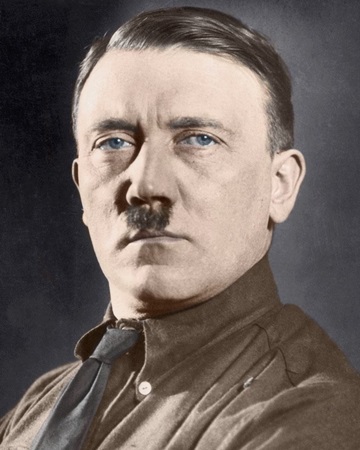
- Born: 1889-01-01 1889-04-20 (Braunau am Inn) (country: Austria-Hungary; located in the administrative territorial entity: Archduchy of Austria above the Enns; statement is subject of: Adolf-Hitler-Geburtshaus)
- Died: 1945-04-30 (Berlin Führerbunker) (country: Nazi Germany; located in the administrative territorial entity: Berlin; statement is subject of: death of Adolf Hitler)
- Country of citizenship: Cisleithania (period: 1889-04-20 through 1918-11-11); First Republic of Austria (period: 1919-01-01 through 1925-04-30); Nazi Germany (end cause: death of Adolf Hitler; period: 1933-01-30 through 1945-04-30); Republic of German-Austria (period: 1918-01-01 through 1919-01-01)
- Occupation: painter (statement is subject of: paintings by Adolf Hitler); political writer; politician (reason for preferred rank: generally used form); soldier
- Member of political party: German Workers' Party (period: 1919-09-12 through 1921-07-11); Nazi Party (series ordinal: 556)
- Member of: Nazi Party
- Participant in: Aktion T4; Beer Hall Putsch; The Holocaust; ethnic cleansing
- Significant person: Albert Speer; Benito Mussolini; Eva Braun; Joseph Stalin
Constantin Neurath, von (Baron; foreign minister)
Constantin von Neurath
German general and Nazi war criminal (1873-1956)
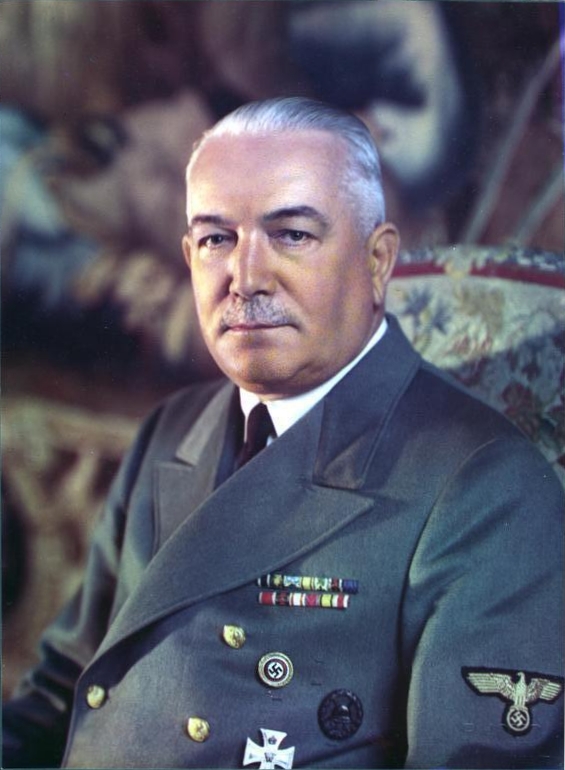
- Born: 1873-02-02 (Kleinglattbach)
- Died: 1956-08-14 (Enzweihingen)
- Country of citizenship: Germany
- Occupation: diplomat; lawyer; politician
- Member of political party: Nazi Party
- Member of: Schutzstaffel
- Military rank: Obergruppenführer
- Position held: German Foreign Minister (period: 1932-06-01 through 1938-02-04; replaced by: Joachim von Ribbentrop; replaces: Heinrich Brüning); ambassador
Wilhelm Frick (Minister of the Interior; chief of Nazi delegation, Reichstag; admin. Plenipotentiary)
Wilhelm Frick
German Nazi official (1877-1946)
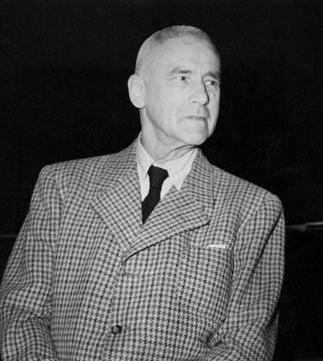
- Born: 1877-03-12 (Alsenz)
- Died: 1946-10-16 (Nuremberg)
- Country of citizenship: Germany
- Occupation: diplomat; lawyer; politician
- Member of political party: German Völkisch Freedom Party; National Socialist Freedom Movement; Nazi Party
- Member of: AGV München; Thule Society
- Participant in: Aryanization; Beer Hall Putsch; International Military Tribunal (role: defendant)
- Position held: Protectorate of Bohemia and Moravia (period: 1943-08-24 through 1945-05-04; replaces: Konstantin von Neurath); Reichsminister des Innern (period: 1933-01-30 through 1943-08-20; replaced by: Heinrich Himmler; replaces: Franz Bracht); member of the Reichstag of Nazi Germany; member of the Reichstag of the Weimar Republic
Lutz Schwerin von Krosigk (Graf; Reich Minister of Finance)
Lutz Graf Schwerin von Krosigk
German nobleman, jurist, and senior Nazi government official (1887-1977)
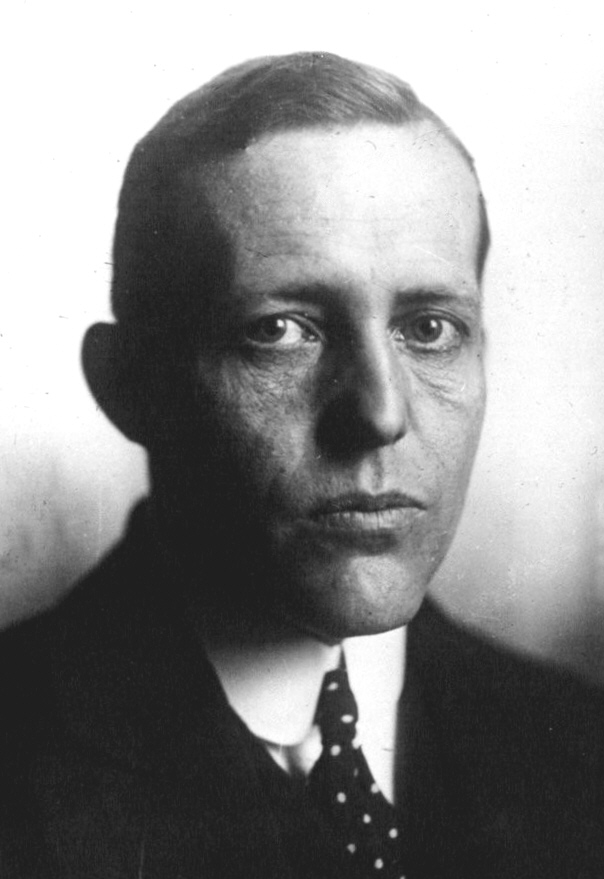
- Born: 1887-08-22 (Rathmannsdorf)
- Died: 1977-04-03 1977-03-04 (Essen)
- Country of citizenship: German Empire; Germany; Nazi Germany; Weimar Republic
- Occupation: diplomat; economist; jurist; military personnel
- Member of political party: Nazi Party (since: 1937-01-30)
- Participant in: Aryanization; Ministries Trial (role: defendant); Nuremberg Medical Trial (date: 1947-02-06; role: affiant)
- Significant person: Karl Brandt (role: acquaintance)
- Position held: Chancellor of Germany (period: 1945-05-01 through 1945-05-23; replaced by: Konrad Adenauer; replaces: Joseph Goebbels); Federal Minister for Foreign Affairs (period: 1945-05-02 through 1945-05-23; replaces: Arthur Seyss-Inquart); German Foreign Minister (period: 1945-05-02 through 1945-05-23; replaced by: Georg Dertinger; replaces: Arthur Seyss-Inquart); Leading Minister (period: 1945-05-01 through 1945-05-23)
Hjalmar Schacht (Dr., Reichsbank president, Minister of Economics, plenipotentiary for war economy)
Hjalmar Schacht
German politician and economist
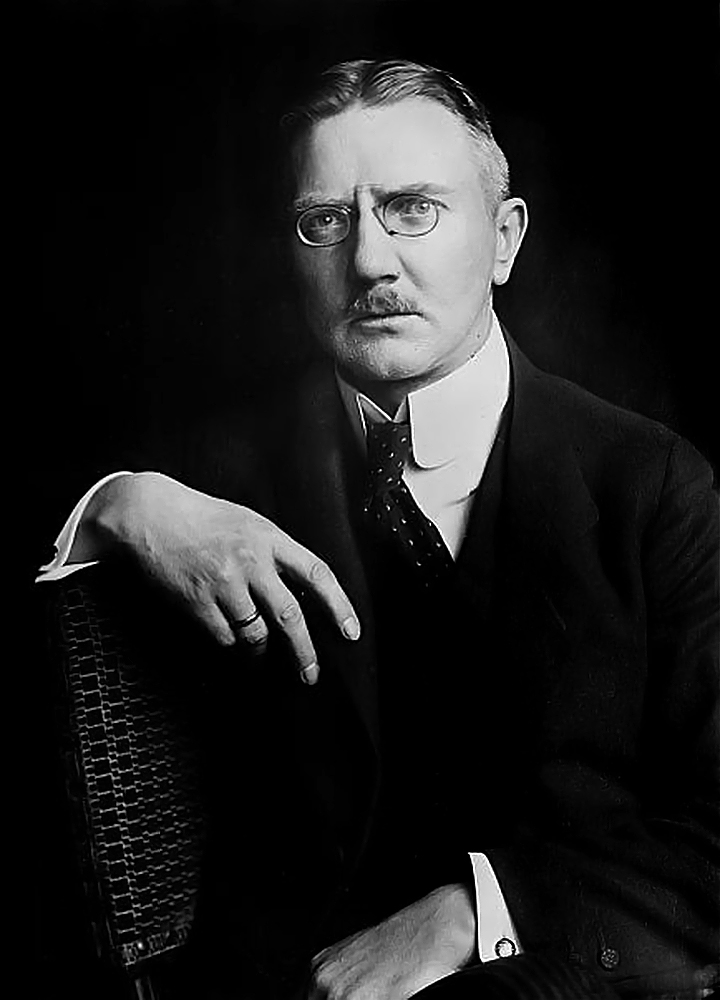
- Born: 1877-01-22 (Tinglev Municipality)
- Died: 1970-06-03 (Munich)
- Country of citizenship: Germany
- Occupation: banker; economist; politician
- Member of political party: German Democratic Party (period: 1918-01-01 through 1926-01-01); Nazi Party (period: 1934-01-01 through 1943-01-01; role: honorary member)
- Member of: German Archaeological Institute
- Participant in: Secret Meeting of 20 February 1933
- Educated at: Gelehrtenschule des Johanneums; Humboldt University of Berlin; Leipzig University; Ludwig Maximilian University of Munich
Franz Seldte (Reich Minister of Labor)
Franz Seldte
German politician (1882-1947)
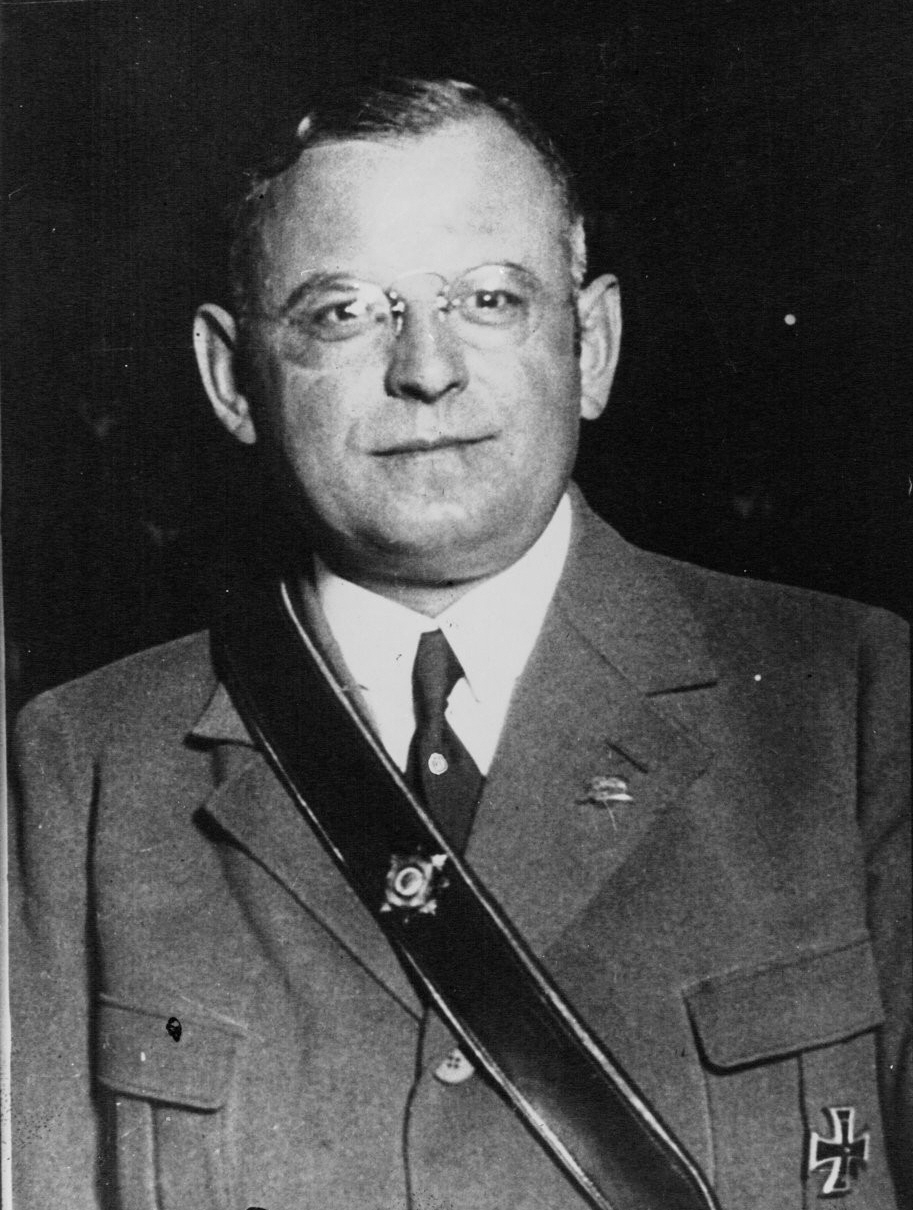
- Born: 1882-06-29 (Magdeburg)
- Died: 1947-04-01 (Fürth)
- Country of citizenship: Germany
- Occupation: politician
- Member of political party: German National People's Party; Nazi Party
- Member of: Der Stahlhelm, Bund der Frontsoldaten
- Military rank: major
- Military branch: Imperial German Army
Franz Guertner (Dr., Minister of Justice 1932-41)
Franz Guertner
Government minister of Germany (1881-1941)
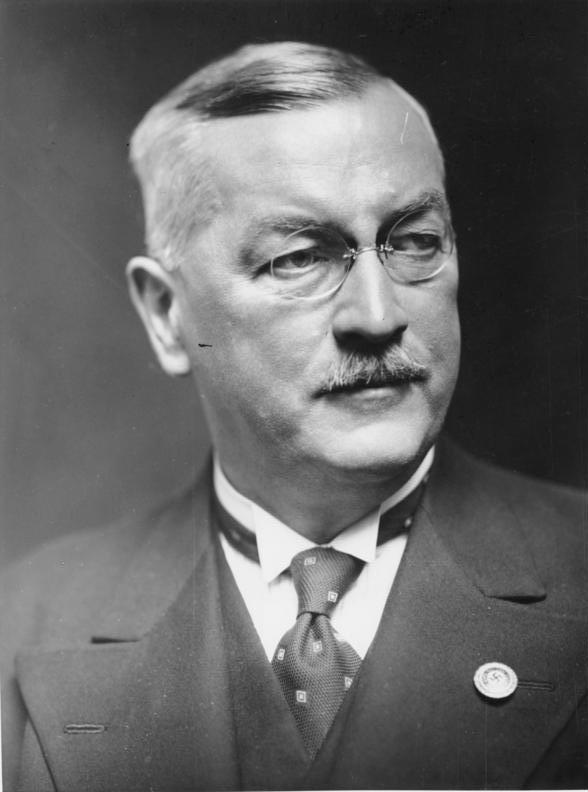
- Born: 1881-08-26 (Regensburg)
- Died: 1941-01-29 (Berlin)
- Country of citizenship: German Reich
- Occupation: jurist; politician
- Member of political party: German National People's Party; Nazi Party; Q15787248
- Participant in: Aktion T4
- Position held: Baviarian Minister of Justice (member of cabinet: Q1719960, Q1719961, ..., Q1720104; period: 1922-08-04 through 1932-06-01; replaced by: Heinrich Spangenberger); Reich Minister of Justice (period: 1932-06-01 through 1941-01-29; replaced by: Franz Schlegelberger; replaces: Curt Joël)
- Educated at: Ludwig Maximilian University of Munich
Werner Blomberg, von (Minister of Defense)
Werner von Blomberg
German field marshal (1878-1946)
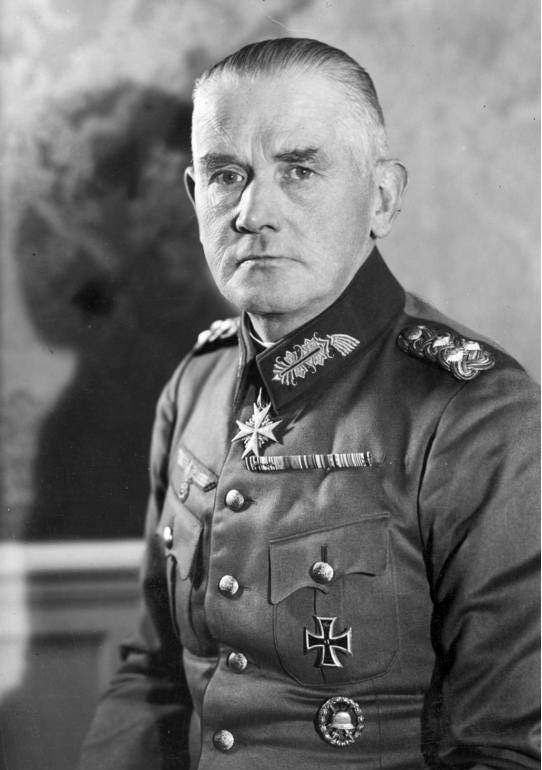
- Born: 1878-09-02 (Stargard)
- Died: 1946-03-14 (Nuremberg)
- Country of citizenship: Germany
- Occupation: military officer; military personnel; politician
- Member of political party: Nazi Party (series ordinal: 3.805.226; since: 1937-01-30)
- Military rank: general field marshal
- Military branch: German Army
- Position held: minister of war
Paul Eltz-Ruhenach, von (freiherr, postal and communications minister)
Paul von Eltz-Ruebenach*
German politician (1875-1943)
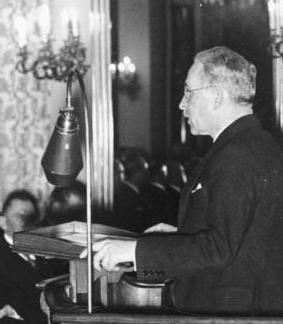
- Born: 1875-02-09 (Wahn)
- Died: 1943-08-25 (Linz am Rhein)
- Country of citizenship: German Reich
- Occupation: politician
- Member of political party: Nazi Party
- Employer: Prussian state railways
- Educated at: RWTH Aachen University; Technical University of Berlin
- VIAF ID: https://viaf.org/viaf/59991886
Richard-Walther Darre (agriculture minister)
Richard-Walther Darré
Nazi SS General (1895-1953)
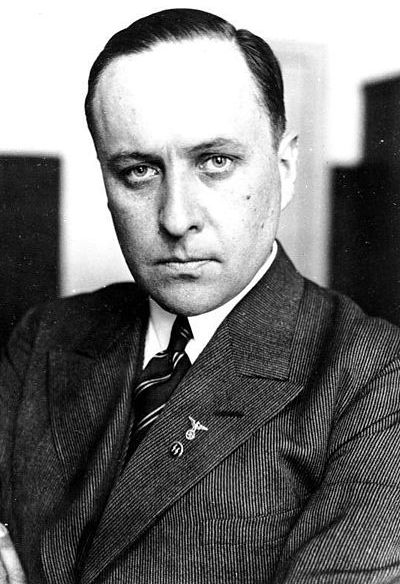
- Born: 1895-07-14 (Buenos Aires Belgrano)
- Died: 1953-09-05 (Munich)
- Country of citizenship: Argentina
- Occupation: agronomist; politician; writer
- Member of political party: Nazi Party
- Member of: Schutzstaffel (series ordinal: 6882; since: 1931-02-25)
- Military rank: general
- Military branch: Imperial German Army
Joseph Goebbels (Dr., Minister of Public Enlightenment and Propaganda)
Joseph Göbbels
Nazi politician and Propaganda Minister
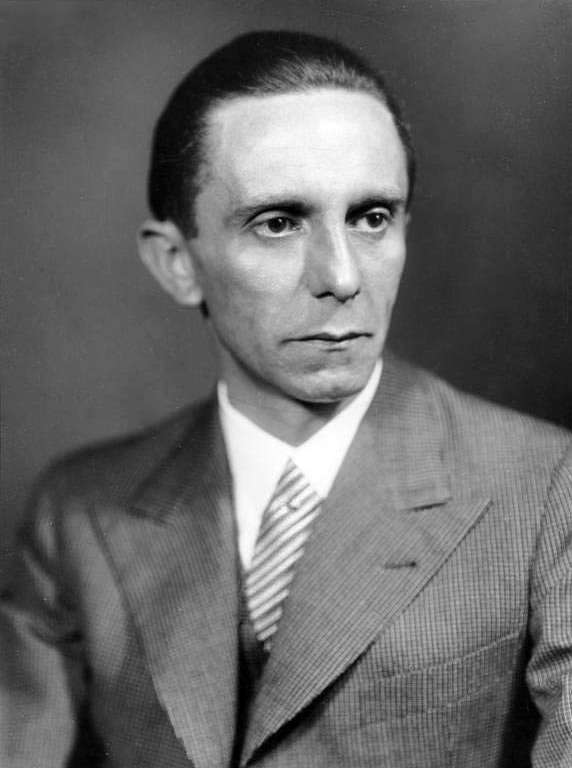
- Born: 1897-10-29 (Rheydt)
- Died: 1945-05-01 (Berlin)
- Country of citizenship: Nazi Germany
- Occupation: autobiographer; demagogue; diarist; journalist
- Member of political party: Nazi Party
- Member of: Wissenschaftlicher Katholischer Studentenverein Unitas Stolzenfels zu Bonn
- Significant person: Adolf Hitler
- Position held: Gauleiter (of: Berlin; period: 1926-11-09 through 1945-05-01; replaces: Ernst Schlange); Q104164731; Reich Chancellor (period: 1945-04-30 through 1945-05-01; replaced by: Lutz Graf Schwerin von Krosigk; replaces: Adolf Hitler); member of the Reichstag of Nazi Germany
Hermann Goering (Reich Marshal; Commander in Chief, Luftwaffe; Commissioner for Four-Year Plan)
Hermann Göring
German Nazi politician, military leader and convicted war criminal (1893–1946)
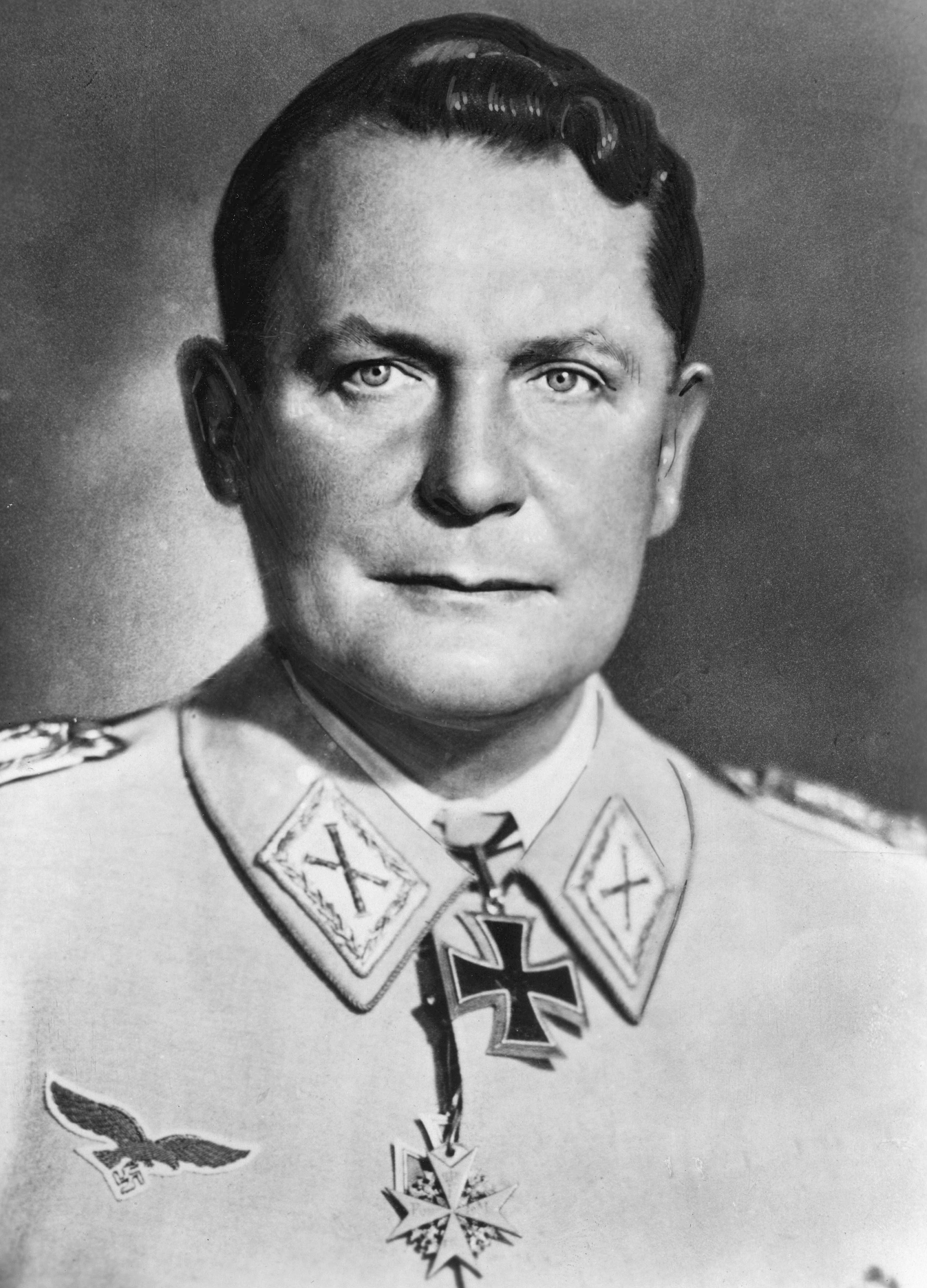
- Born: 1893-01-12 (Rosenheim)
- Died: 1945-01-01 1946-10-15 (Nuremberg Court Prison Nuremberg) (reason for deprecated rank: error in referenced source or sources; reason for preferred rank: most precise value)
- Country of citizenship: German Empire; Nazi Germany
- Occupation: aircraft pilot; art collector; politician; war criminal
- Member of political party: Nazi Party (period: 1922-11-01 through 1923-11-23, 1928-04-01 through 1945-04-29)
- Member of: Sturmabteilung
- Participant in: Beer Hall Putsch; Nazi plunder; genocide; war crime
- Significant person: Alma Hedin (role: friend)
Bernhard Rust (minister for science, education, and culture)
Bernhard Rust
German Holocaust perpetrator (1883-1945)
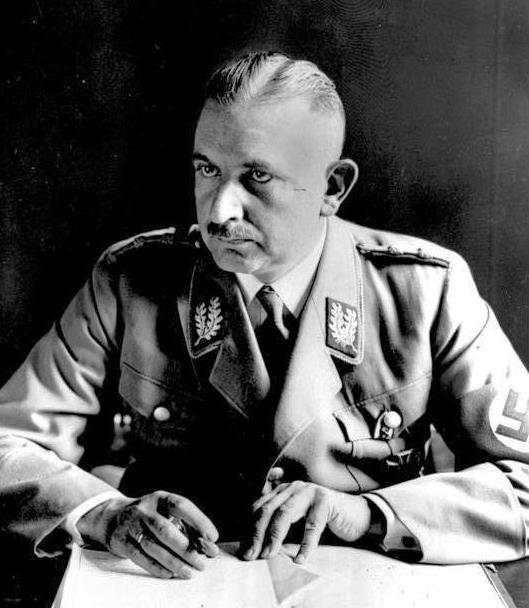
- Born: 1883-09-30 (Hanover)
- Died: 1945-05-08 (Nübel)
- Country of citizenship: Germany
- Occupation: politician
- Member of political party: German Völkisch Freedom Party; Nazi Party
- Member of: Deutschvölkischer Schutz und Trutzbund; Militant League for German Culture; Sturmabteilung
- Military rank: lieutenant
- Position held: Reichsminister; member of the Reichstag of Nazi Germany; member of the Reichstag of the Weimar Republic
Rudolf Hess (Deputy to the Fuehrer; minister without portfolio)
Rudolf Hess
German Nazi leader (1894-1987)
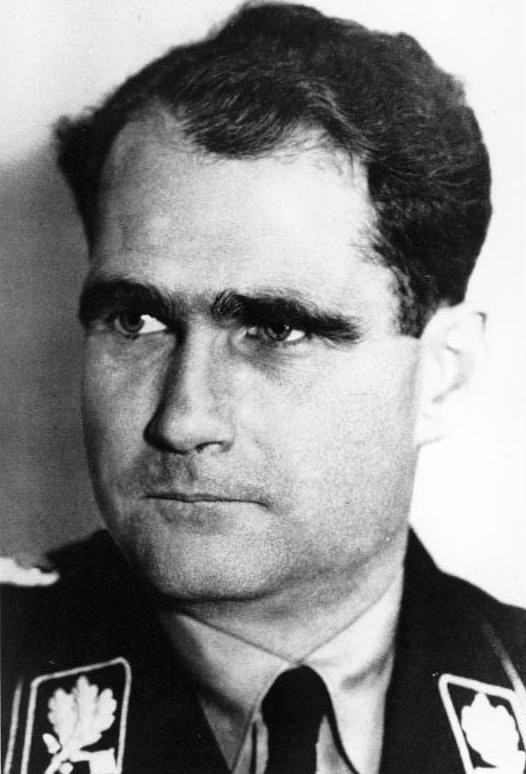
- Born: 1894-04-26 (Alexandria)
- Died: 1987-08-17 (Spandau Prison) (located in the administrative territorial entity: West Berlin)
- Country of citizenship: Germany
- Occupation: aircraft pilot; politician
- Member of political party: Nazi Party
- Member of: Thule Society
- Participant in: Beer Hall Putsch
- Military rank: lieutenant
Hanns Kerrl (Reich Minister for Church Affairs (1935-38); justice minister, Prussia (1933-34))
Hanns Kerrl
Nazi Minister for Religion (1887-1941)
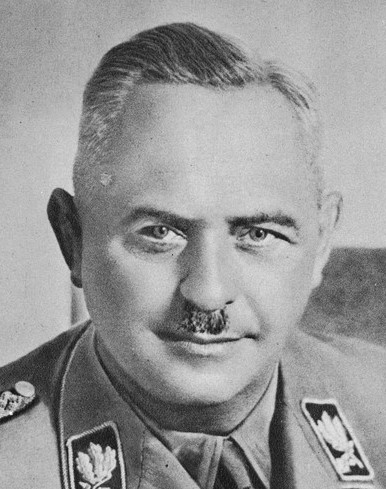
- Born: 1887-12-11 (Fallersleben)
- Died: 1941-12-15 1941-12-12 (Paris)
- Country of citizenship: German Reich
- Occupation: politician
- Member of political party: Nazi Party
- Member of: Sturmabteilung
- Significant person: Paul Lindemann
- Position held: Member of Landtag of Prussia; member of the Reichstag of Nazi Germany; minister
Hans Frank (Chief of Legal Office, NSDAP; Governor General of Poland)
Hans Frank
German lawyer, Nazi politician, General Governor of Nazi occupied Poland and convicted war criminal (1900-1946)
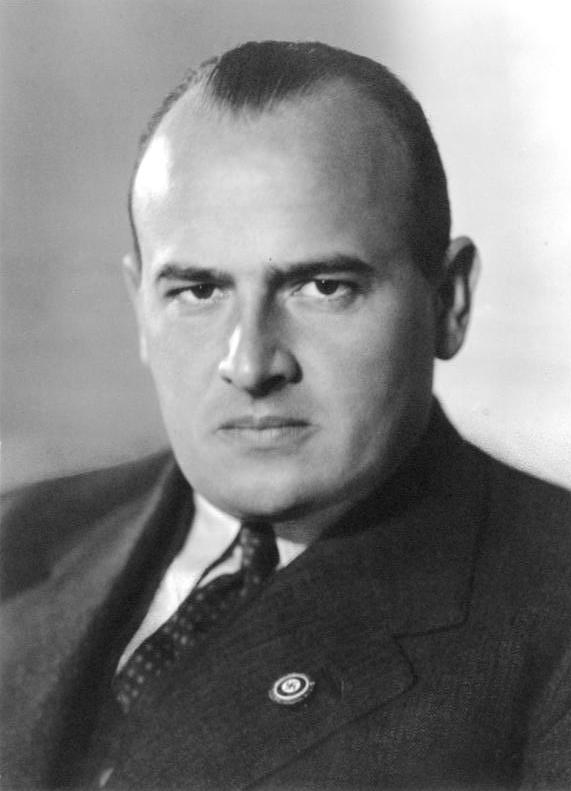
- Born: 1900-05-23 (Karlsruhe)
- Died: 1946-10-16 (Nuremberg Nuremberg Court Prison) (reason for deprecated rank: item/value with less precision and/or accuracy; reason for preferred rank: most precise value)
- Country of citizenship: Germany
- Occupation: lawyer; politician
- Member of political party: German Workers' Party (since: 1919-01-01); Nazi Party
- Member of: Sturmabteilung; Thule Society
- Participant in: Beer Hall Putsch
- Significant person: John C. Woods (role: executioner)
Date: 16 March 1935
Literal Title: 1935 Reichsgesetzblatt . . . To the German People!
Defendants: Hans Frank, Wilhelm Frick, Hermann Wilhelm Goering, Rudolf Hess, Constantin Neurath, von, Hjalmar Schacht
Total Pages: 5
Language of Text: English
Source of Text: Nazi conspiracy and aggression (Office of United States Chief of Counsel for Prosecution of Axis Criminality. Washington, D.C. : U.S. Government Printing Office, 1946.)
Evidence Code: PS-1654
Citation: IMT (page 2307)
HLSL Item No.: 450612
Notes:PS 1654 was entered for judicial notice without an exhibit number; it was also cited in the case on Goering (8 January 1946). The Armed Forces Law was signed by Hitler and members of the cabinet.